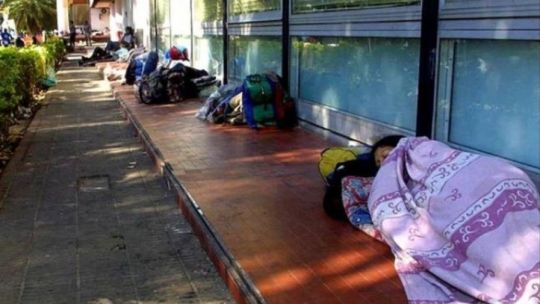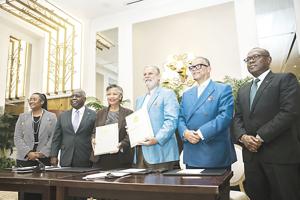Jonathan Gómez sweeps the pavement diligently, he lays his mattress and lights up a heater to fight the cold on a street in the Argentine capital, where destitution has doubled in a year while half the population in the country is poor. “I collect cardboard in a very difficult economy, which is increasingly complicated”, said Jonathan, aged 30, to AFP. He has worked in the food industry and construction until last year, but jobs starting getting fewer and farther between and his life fell apart.
Two tins and a stove lighter double as his improvised kitchen, a cart is all he owns. “We have three blankets and a hug” against winter, laughs Jonathan while he holds his partner María de los Ángeles López, 33 years old, who calls herself a “housewife”. Both are lying down in a mattress a few metres away from the luxury buildings in Puerto Madero and the most exclusive restaurants in Buenos Aires.

After the first three months of the government of ultra-liberal Javier Milei, the Buenos Aires statistics bureau reported that the destitution rate hit ceilings since it began being measured in 2015. The rate doubled to 16 percent from the first quarter of 2023. Four homeless people have died of hypothermia over the last few weeks in Buenos Aires amid a cold snap.
Many refuse to sleep in state shelters for fear of assault. “The police sometimes brings you a mattress, blankets, for you to go to a shelter that looks like a prison and for people with money to turn a blind eye on the economic and social crisis and shove us under the rug”, said Jonathan. Nationwide, poverty was 41.
7 percent as of the second semester of 2023, according to the Indec national statistics bureau which will publish its next calculations in September. Yet the projections of the Universidad Católica Argentina (UCA) place it at 55 percent, a record hit by Argentina in 2002 during its worst recent economic crisis. The current crisis pushed the poorest to destitution and vast sectors of the middle class became newly poor, stated UCA.
The income gap between households and the price of the food basket which define the poverty and destitution line has widened enormously in a recession economy with over 270-percent year-to-year inflation as of June and 7-percent unemployment. “There is a loss in homes, not only of purchasing power for salaries, but unemployment among heads of the family”, explained Eduardo Donza, researcher at UCA’s Social Debt Observatory. Poverty has stayed above 20 percent for over two decades.
“We have structural poverty, with a third generation of children and teenagers born into exclusion”, defined Donza. It is the case of Gabriela Costas, who at 45 years old has been living in the street since age nine. Neither centre-left nor right-wing governments have managed to pull her out of destitution.
“I have lived in the street my whole life. When they throw things out in bins we pick them up and that’s how we eat”, she told AFP. Her son Alexandre Barrales, at 18 years old, lives and studies at the secondary school of a foundation’s home, where he found shelter when he was 13.
Alexandre helps his mother out while he looks for work: “In the future I intend to do a project to sell food, set up a stall in the street, anything to get ahead”, he stated. Whereas the government is fighting a court order to distribute tonnes of food to hundreds of soup kitchens currently being audited, university students are relaunching a response to hunger. At a warehouse at the Universidad Nacional de Quilmes, outside Buenos Aires, a queue of people await a plate of “Super soup” during an outdoor soup kitchen, a solidary mechanism to distribute food.
It is the relaunch of this food high in protein developed by the UNQ during the 2002 crisis to offer low-cost proteins to vulnerable sectors, in a cattle-raising country that is eating an increasingly lower amount of meat due to rising prices. After years of being closed down, the plant became reactivated a month ago, and has already received orders, even from Chile and Brazil. A sponsorship system finances it together with the university.
Today “we once again have an economic crisis, we’re at a food emergency with nearly six out of ten Argentines under the poverty line, which translates into 27 million people going to bed hungry”, Anahí Cuellas, director of the plant, told AFP. During a first stage they are to produce 75,000 portions at a cost of 680 pesos a plate (some US$0.6), but they are getting ready for much more.
“Need will unfortunately grow”, forecast Cuellas. --TIMES/AFP Ads Space Ads Space.



















